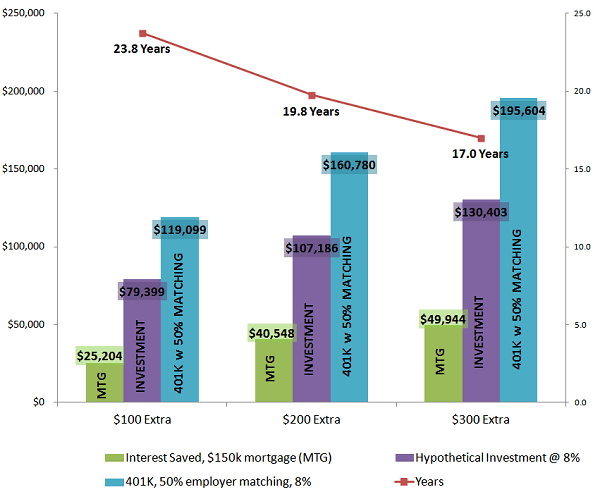Aug
How much are you paying for the peace of mind of owning a free and clear home?
We are taught from an early age that debt is bad, and in most cases, carrying significant debt is not a good idea. If you are carrying a large balance on your credit cards, you should pay that off as soon as you can. If you have other secured or unsecured debt, you should pay that off as well. But when it comes to your mortgage, opinions differ regarding whether you should pay your mortgage off early or use the money for other purposes.
Each person and his situation are unique. In order to determine if paying off your mortgage or boosting your savings account is the right choice for you, it is best to look at the benefits and costs of paying off your mortgage.
Benefits of paying off your mortgage ahead of schedule
The chief benefit of paying off your mortgage is the fact that you are free of debt. You own your home, and no one can take it away from you. It’s yours, but owning your home free and clear is a hard benefit to quantify.
Let’s look at a benefit we *can* quantify by calculating how much you could potentially save by paying off your mortgage early. In our examples, we are going to use a 30 year fixed mortgage for $150,000 at an interest rate of 4%.
- By paying just a $100 more a month you can pay off this mortgage in less than 24 years (23 years and 9 months, or 23.8 years as shown in the chart below)
- A $200 extra payment reduces the repayment term to less than 20 years (19 years and 9 months)
- A $300 payment reduces it to 17 years.
Many borrowers look at this and draw the conclusion that paying down their mortgage early seems like a good use of their disposable income, which it is. But is it the *best* use of that money?
What do the numbers say?
Rather than paying down your mortgage, let’s look what would happen if you invested that extra money into either one of the following, for the exact same corresponding period of time
- A long term instrument returning 8% per annum (indicative long term return from mutual funds, stock market, etc.)
- Your 401k plan where the employer matches 50% of your contribution, returning 8% (indicative)
HOW MUCH DOES THAT EXTRA PAYMENT ADD UP TO?

Long term instrument returning 8% p.a.
- $100 a month for 23.8 years adds up to over $79,000
- $200 a month for 19.8 years adds up to over $107,000
- $300 a month for 17 years adds up to over $130,000
401k returning 8% p.a. with 50% employer matching
One thing that is always discussed when people bring up investments is return on investment. With many employers matching up to 50-percent of your contribution to your 401k, investing in a 401k is often the best return on investment available.
- $100 a month for 23.8 years adds up to over $119,000
- $200 a month for 19.8 years adds up to over $160,000
- $300 a month for 17 years adds up to over $195,000
That is a significant difference. As you can see, paying down your mortgage may not be the best use of your disposable income.
In fact, when you factor in the comparatively low rate of interest for home loans and the tax incentives offered by federal and state governments, it may not be a good idea at all!
Intangible factors and other things to keep in mind
From a strictly numbers standpoint, making additional contributions to your 401k or other long term investment is the superior choice, but we cannot forget the following non-quantifiable factors –
- The peace of mind that comes from owning your home free and clear is considered invaluable by many. But ask yourself if that invaluable peace of mind is worth $30,000. How about $50,000 or even $100,000? Is it worth the cost of a college education for one of your children or grandchildren?
- A 401K ordinarily won’t be returned to you until you retire and there are often penalties for early withdrawal. But then, the equity you build in your mortgage by paying it early isn’t easily encashed either.
- Are you saving enough for retirement to maintain the lifestyle you want? Most Americans aren’t even close
- Interest rates today are at all time lows. You could lock in a low fixed rate now and invest future increases in income or disposable income at a relatively higher rate of return.
- Say you’re considering the upper end of this example, where you’d be paying $300 extra a month on a $150,000 mortgage. Instead, you could choose to refinance into a shorter term mortgage, such as a 20 year mortgage, where the interest rates are better, payments are only slightly higher than a 30 year, and invest your disposable income elsewhere.
Disclaimer: Please consult your financial advisor before making long term financial decisions.
Facebook comments:
Powered by Facebook Comments


